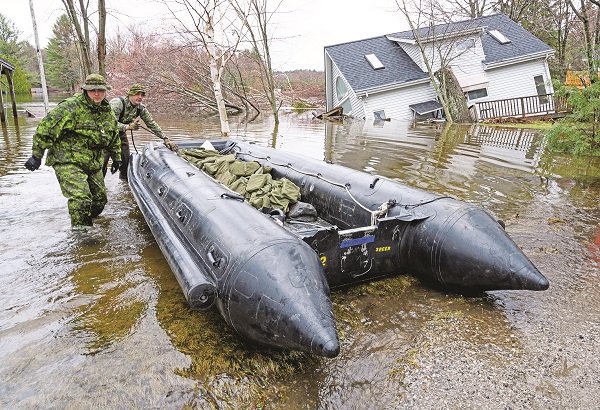|
The Auroran http://www.newspapers-online.com/auroran/local-dentist-focuses-new-lens-on-climate-change/ Export date: Fri Apr 19 11:12:48 2024 / +0000 GMT |
Local dentist focuses new lens on climate change By Brock Weir As Ron Goodlin began slowing down his career in dentistry, his energies were redirected to another passion: photography. Now, with more time to be behind the camera, he's tasked himself with a new mission: focusing his lens on the impacts of climate change. While the well-known Aurora dentist has previously exhibited his wildlife photography taken on safari in Southern Africa and other exotic locales around the world, his quest to shine a light on one of the biggest global issues today took him surprisingly close to home. Armed with his camera, sturdy boots and a friend with an SUV, Dr. Goodlin headed due north to Bracebridge, the Muskoka-area community ravaged by intense flooding this past spring. Once on the scene, it wasn't hard for the duo to find inspiration – albeit difficult inspiration – for their photographs. As they followed the line of the Muskoka River, they saw homes half-engulfed in the rushing water, boats floating up to the tops of their respective boathouses and being crushed against the ceiling, floating debris which could only be remnants of homes that didn't fare as well, and bridges that were all but submerged. “As we kept going down, we saw sandbags at the sides of the roads, sandbags around houses to protect the homes, and their front lawns and back lawns were absolute lakes,” he recalls. “Some of them were saved, some had water going in, and then we could see where some of the roads had actually been washed away and trucks were going back and forth with loads of stone and gravel to try and rebuild. “Then, as we went down the river a little bit more, there was one guy we saw – and, well, just the look on his face was horrible. An older gentleman, he had on waders, parked on the side of the road, and he looked distraught as he got out into the water. We asked, ‘Is that your house,' and he just nodded and said, ‘Insurance won't pay, I've lost everything.' He had tears in his eyes, walked over to his house, opened his garage door, a bunch of stuff fell out that he pushed back in, just looked at us, went inside, and closed the garage door. He couldn't even face us or talk to anybody, he was so upset.” But the team persevered on their mission to capture the devastation. They saw vehicles from the Canadian Armed Forces helping residents, helping residents into rafts and carrying out search and rescue missions up and down the river. They watched them remove trees that were in danger of being swept up and destroying surviving homes below, while others went door to door making sure everything was okay with the residents still inside. “We hear so much bad news nowadays that seemingly we're not even affected by it,” he says. “We hear of people getting shot, getting into a car crash, losing a home to fire, and, in this case, people losing their homes and everything they own in a flood, and it's so easy for us to just say, ‘Yeah, that's too bad,' and then forget about it. When you actually see the devastation, when you actually see the people and talk to them, it breaks your heart. We're so acclimatized to all this bad news that we just gloss over it and we're not doing anything about it. “Climate change is a huge deal. It is affecting us. With the wildfires and the extreme weather patterns and flooding, these are all direct impacts of climate change and yet none of us are really doing anything about it. What are we doing about our cars? What are we doing about limiting our gas emissions and carbon emissions? What are we doing about reducing our red meat intake so there are fewer cattle producing the methane causing greenhouse gases? What are we doing about riding our bicycle instead of taking our vehicle, or not letting your car idle when you're waiting in a parking lot for your spouse? Simple things that all of us could be doing to help out this situation and none of us really think of it because we see the news and we just think, ‘Oh, that's too bad,' and we go onto the next thing.” Since slowing down his practice, Dr. Goodlin says he has done many different shows featuring his photography, but he wants to ensure each shot is meaningful and has a purpose. In addition to the shots he took in Bracebridge, he's been turning his camera to endangered species of wildlife both local and further afield, documented the impact of habitats lost to the oil and gas industry, and other ecological problems. Photos have included polar bears starving in the Arctic, penguins struggling to build nests in the mud where all the ice has melted away, and grizzlies looking for some semblance of their lost home. “I want to bring people's attention to what we're doing to our planet,” says Dr. Goodlin on what he ultimately wants to do with these images. “Our world is in trouble and we need to do something fast. All the scientists, the UN, they are all pointing to the same thing: by 2050 it is going to be too late.” |
| Excerpt: Ron Goodlin takes passion for photography and uses it as a medium to spark change and highlight perils of climate change. |
|
Post date: 2019-08-15 19:48:34 Post date GMT: 2019-08-15 23:48:34 Post modified date: 2019-08-21 18:53:05 Post modified date GMT: 2019-08-21 22:53:05 |
|
Export date: Fri Apr 19 11:12:48 2024 / +0000 GMT This page was exported from The Auroran [ http://www.newspapers-online.com/auroran ] Export of Post and Page has been powered by [ Universal Post Manager ] plugin from www.ProfProjects.com |